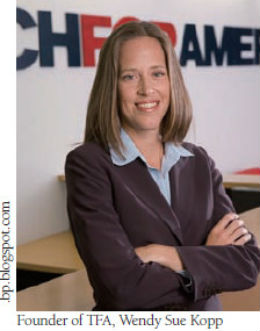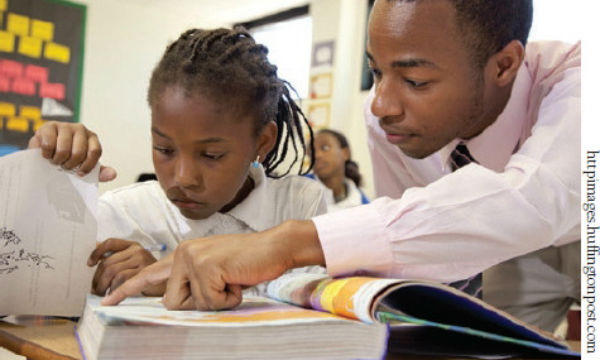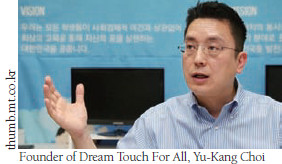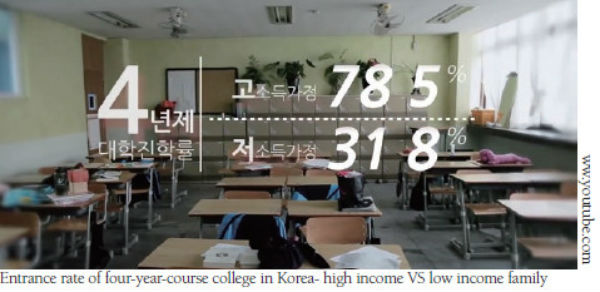What do you think success in modern society means? In Korea, most college students would come up with ideas like high educational background, salary and social status. When someone says “to get a job which suits one’s personality” or “social contribution as an answer of the question, people would laugh and saying that is too unrealistic and idealistic. However, unrealistic and idealistic things are gradually starting to happen in America from about 20 years ago. Moreover, in Korea, a movement which is influenced by America is also progressing for a few years now. These movements began because of the awareness of education-inequality problem by the young intellectuals. What made the young intellectual to dedicate themselves to this movement by giving up the opportunity of achieving enormous wealth and status? The Sungkyun Times (SKT) finds out the reason by looking into “Teach For America” and its Korean version “Dream Touch For All,” which are called modern-day noblesse oblige.
Teach For America (TFA)
What is TFA?

TFA is a nonprofit organization made to solve the social problem of America’s education-inequality. TFA’s motto is “One day, all children in this nation will have the opportunity to attain an excellent education.” TFA was established by Wendy Sue Kopp who graduated from Princeton University. She was born into a rich family in Texas and was well educated without any financial hardship. However, when Wendy was at college, she was faced with the failure of America’s public education and its inequality which depends on the student’s social class background. Therefore, she came up with the idea of TFA in her graduation thesis. After she graduated, in 1990, she founded TFA. Corporations such as Mobil, Hertz and Morgan Stanley supported her by sponsoring $26,000, an office and six cars. Also, many prestigious school students took interest in Wendy Kopp’s idea and about 4,000 students applied to the program in the first year.
How TFA Works

TFA is not a kind of temporary voluntary work but a permanent position for two years and the salary of the workers is not that much. TFA recruits members by running a wanted ad. After the selection, students receive intense training for five weeks and go into the field. Although the students have no license, outcomes such as the improvement of study or the participation rate of students were similar or better than the seasoned regular school teachers. The reason is that the volunteers of TFA sincerely care about how to teach their students well by giving up their own time.
Influence of TFA
Wendy Sue Kopp was selected as “one of seven most influential educators in the world” by global business magazine Forbes. The states in which TFA members teach broadened from 6 to 45. Around 12,000 teachers worked for TFA and the number of students they taught is around 2.5 million. About 63% of students who participated in TFA for two years decide to work in the educational field continuously and 4,000 of them work as teachers. There are also many educational celebrities who worked at TFA. Mike Feinberg and Dave Levin, who finished working for TFA in 1994, established “Knowledge is Power Program” which helps middle school students in poor regions to go to college. This project makes it possible to manage schools creatively so that it can gain huge positive results. Moreover, Michelle Rhee, who worked for TFA, became a superintendent of education in Washington D.C from 2007 to 2010. Like this, TFA not only made it possible to help students in poor surroundings to improve their academic abilities, but also played a role in broadening its influence to the various educational fields by inspiring the participants of TFA.
American’s Reaction to TFA
At first, there were many skeptical opinions. However, TFA dispelled worries by proving the quality of education and showing the passion of students. Today, many statistics prove the popularity of TFA among American students: as many as 18% of Harvard University and Yale University graduates apply to TFA, top ten in ranking of undergraduates’ first wish job since 2007. Moreover, graduate school and conglomerate’s support is notable. Some American graduate schools give advantages to the student who worked in TFA. Also, companies such as General Electric, Deloitte and JP Morgan Chase & Co allow their new employee to participate in TFA for two years before getting a position. This positive social atmosphere toward the participation in TFA shows that American society regards the young intellectuals’ social contribution as important and positive.
Dream Touch For All
What is Dream Touch For All?

Dream Touch For All is a Korean version of TFA and it was established in 2011. Yu-gang Choi, who is now a CEO of Dream Touch For All, first came into the idea of making the Korean version of TFA when he was a student of the Harvard Kennedy School. As a student, he was shocked to know about TFA in which America’s most talented young people try to confront the educational problem. Moreover, this movement has started from 1990. Therefore, after he graduated, he came back to Korea and realized his dream in 2011: making the Korean version of TFA, Dream Touch For All. This idea is certainly needed for Korean society because Korea is suffering from the collapse of public education caused by the competition of private education. Thereby, the amount and quality of educational gap between the rich and the poor is widening. The words from the promotional video show the organization’s intention well: “Our children’s precious dream should not be determined by their given environment. Still, many Korean children have obstacles such as social and educational gap blocking the chance to show their outstanding potential. The gap of education should not be connected to the gap of dreams.”

How Dream Touch For All Works
Dream Touch For All is similar to TFA in selecting members: posting a job opening and recruiting elite members by a strict procedure. However, Dream Touch For All is closer to the concept of voluntary work than TFA because students or members who work as teachers do not get paid. Also, in contrast to the social recognition and compensation like America, there are no substantive benefits of social recognition in Korea. Dream Touch For All usually plays an active part in afterschool classes. As a result, in 2014, Dream Touch For All won the grand prize for the part of community partner. Moreover, the enthusiasm of Korean intellectuals is surprisingly huge. Many intellectuals in Korea refuse to go to first-class law firms, conglomerates and investment banks to solve the Korean educational problems. Now, it has around 350 volunteers including 50 foreign country volunteers and about 50 to 60 students working per semester. Its aim is to help 3% of schools among 11,000 schools in Korea, the 300 to 400 schools which have the poorest educational surroundings.
After looking into TFA and Dream Touch For All, you can find out the answer to the question in the introduction: intellectual’s sense of responsibility about social problem and young enthusiasm. Sincere behavior, when looking widely, changes the society and the main character of the change can be us, students. According to the data in the Dream Touch For All website, there are many volunteers from prestigious schools in Korea, but Sungkyunkwan University is yet not on the list. The SKT suggests Kingos to remind that social contribution is important in being a member of society. How about having an interest in these groups?
